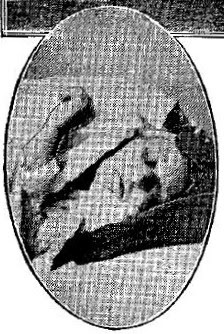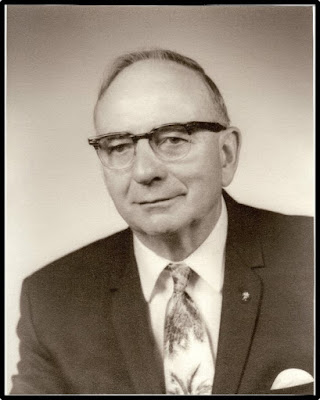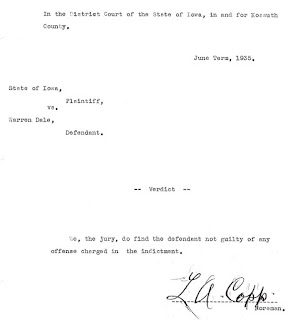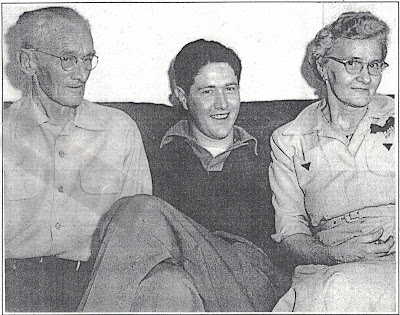The Kossuth County Genealogical Society hosted a program entitled, "Murder, Mayhem and Madness" on October 30th. Many stories of murder and strange happenings were told. For those of you who couldn't attend, here is my contribution to the program. Have a happy Halloween!
THE CRIME
On
the afternoon of Friday, April 26th, 1935, Gertie Dale stopped by
the home of her mother, Anna Jorgenson, for a regular visit. Anna resided at her home located at 222 West
College Street, directly north of the hospital, and Gertie stopped by often
just to check on her. Anna had lived
alone in the two-story, well-kept residence since the death of her husband,
Anton, several years before. At the age
of 75, Anna was active and independent.
Gertie was aware that Aggie Knapp, a close friend, had stopped by to
visit the evening before and was looking forward to hearing all about it from
her mother.
 |
| The Jorgenson home |
She
stepped up on the porch and attempted to turn the knob of the front door. The door was locked which was unusual for
this time of day. Gertie tried the back
door and found that locked as well.
Confused and fearful, she asked Don Cook, who managed the grocery story
nearby, to help her open a rear door. Once
inside, Mr. Cook found Anna, barely alive, lying on the kitchen floor in a pool
of her own blood and vomit. Blood
spatter across the room indicated a terrific struggle. The house had been ransacked. The Sheriff, police and doctor were called
immediately.
 |
| Anna Jorgenson on her death bed |
Jorgenson
was carried across the street to the hospital for treatment. She had been brutally beaten, suffering two
bone-crushing blows to the head which fractured her skull. Despite the valiant efforts of medicine at
the time, Anna Jorgenson never regained consciousness and died the following
Monday.
SUSPECT ARRESTED
An
arrest was quickly made. Warren Dale,
brother-in-law of Gertie Dale, was taken into custody and booked on a charge of
vagrancy to keep him from leaving town.
Officers suspected his involvement in the robbery and murder, but were
still gathering evidence.
Dale
had quite a rap sheet. He had previously
served time at the Iowa State Penitentiary in Anamosa for burglary as well as
time in the Minnesota State Pen in Stillwater for second degree assault, grand
larceny and third degree burglary. He
was no stranger to law enforcement.
Rumor
had it that the victim kept a large sum of money in her home, but how much
remained a mystery. It was known that
Dale and Mrs. Jorgenson were acquaintances since his brother was married to her
daughter and he had performed odd jobs for her. When questioned, Dale maintained his innocence
despite hours of grilling by Sheriff Carl Dahlhauser. On May 2nd, a Trial Information
was filed charging him with the unlawful and felonious murder of Anna
Jorgenson. A murder weapon was never
found nor were finger print experts able to provide any evidence.
A
request for a mental examination by L. A. Winkel, court appointed defense
attorney, was approved by the court.
Dale was examined by A. Ristine, Superintendent of the Cherokee State
Insane Hospital and was found competent to stand trial. Winkel also argued for a change of venue, but
to no avail. Trial was set to begin June
17th.
Without
any eye witness to the offense, murder weapon or fingerprints, the State
planned to prove its case using circumstantial evidence—testimony of others who
had witnessed various acts and participated in conversations leading up to the
crime. Maurice C. McMahon was serving as
County Attorney and prosecuted the case.
THE TRIAL BEGINS
The
courtroom was packed to capacity each day of the trial. Even standing room was at a premium. Some audience members brought their lunch
with them in order to keep their seats over the noon hour, and many ladies
worked on their knitting and tatting during breaks.
The
testimony of three witnesses – Harry Stoner, Glen McVay and Lottie McVay – would
be pivotal in this case. Those three,
along with Dale, had been drinking the afternoon of April 25th and
shared supper together at the McVay house.
According to Lottie McVay, during the meal Dale asked Stoner if he knew
Mrs. Jorgenson and then stated that he was going to “trap her that night.” The four drove to the home of Art Penton
around 7:30 that evening in an attempt to get a gun to use in committing the
robbery. Glen McVay testified that sometime
later he dropped off Dale and Stoner in the driveway of the Kossuth County
Hospital about one-half block from the Jorgenson home and watched as they
crossed the street toward the house.
Harry
Stoner stated that after McVay left Dale said to him, “There’s some money there
(pointing to Mrs. Jorgenson’s house), I’m gonna tap her.” Stoner testified that
he told Dale, “I don’t want that kind of money,” and then Dale told him “to go
to Hell. I’ll do the job myself.” Stoner then claimed that he left and went
back to the McVay house, leaving Dale alone.
Each
of the men managed to make it back to the McVay house. First Glen, then Harry about a half hour
later, and finally Warren Dale arrived around 11 pm. Dale begged McVay to give him a ride to Fort
Dodge and offered him a $20 bill for his trouble. The prosecution took this opportunity to
point out that Mrs. Jorgenson had stored her savings in $20 bills in a tin box
in her home. McVay refused and so Dale
called Art Waltman who picked him up.
After stopping at Matt Selzar’s restaurant on Highway 18, Waltman took
Dale to Art Penton’s house where he left him.
The
trial lasted for five days. Through
vigorous cross examination, Attorney Winkel discredited each prosecution
witness. Lottie McVay admitted that she
had never legally divorced her first husband before marrying Glen and was
accused of bigamy and adultery. Illegal
purchase of bootleg liquor and perjury also came into question when Lottie
testified as to the drinking done by the four at their home while Glen denied
such actions in his testimony. Lottie
McVay, when asked “Isn’t it true that you and your husband and Harry Stoner
planned the whole thing?” said yes, causing gasps in the packed courtroom, but
then changed her answer under cross-examination. Dale’s defense as presented by Winkel was that
he drank alcohol provided by Stoner and McVay which made him ill and he was
used as a dupe to take the blame for the crime.
 |
| Lawrence Winkel |
At
the close of the case, McMahon gave his closing argument followed by an
impassioned three and a half hour plea by Mr. Winkel, going over the evidence,
piece by piece and step by step, in an effort to show the framing of his client
and to anticipate any further comments to come in the response to his closing
by J.D. Lowe, specially appointed assistant county attorney. Mr. Lowe’s
contention was that if Dale was not guilty, he should have been willing to take
the stand and tell the court the true facts.
Before
sending the jury to deliberation, Judge Heald read the jury instructions to
them. As a part of the instructions, they
were given five forms of verdict. Guilty
of first degree murder with punishment being death by hanging; guilty of first
degree murder with life imprisonment; guilty of second degree murder; guilty of
manslaughter; or not guilty.
VERDICT REACHED
Once
impaneled, the jury took an initial vote—it was 7 to 5 for acquittal. A final verdict would not be easily reached
by jurors almost evenly divided. After
17 long hours of deliberation, the jury returned a not guilty verdict around
10:15 on Saturday morning. Judge Heald
thanked the jury and told them that he felt they had arrived at the correct
conclusion in view of the evidence presented.
Jury members unanimously agreed that witnesses Stoner and the two McVays
should all be behind bars.
 |
| The Not Guilty Verdict |
Dale’s joy at the acquittal was short-lived as he was immediately arrested for larceny of an automobile for which he would receive a sentence of 25 years in prison.
A SECOND ARREST
Within
a few days an arrest warrant was issued for Harry Stoner, charging him with
murder. He had conveniently skipped town
and was not located until almost two years later when he was picked up in
Waterloo for attempting to cash a bad check.
He was brought back to Algona January 13, 1937. Soon Glen and Lottie McVay were also
arrested—he for conspiracy to commit a robbery and she for bigamy. The three were placed in three separate jails
so that they could not collaborate on a story.
Interestingly,
L. A. Winkel had just taken office as County Attorney after having been elected
to the position the previous fall. He
was determined to see someone answer for the crime. Stoner was placed in solitary confinement and
not allowed to mingle with other prisoners, despite his constant pleas to do
so. After several days of unsuccessful
attempts to get him to confess, Glen McVay was brought to Algona and the two
were placed in the same cell. Gaylord D.
Shumway, who had been appointed special prosecutor, arranged for the placement
of a dictograph in the jail, near the very cell in which the two prisoners were
detained. Wires were strung from the
jail into the home of Sheriff Casey Loss.
A group including Winkel, Shumway, Loss and several city police officers
took turns monitoring the dictograph. It
didn’t take long before the conversations between the inmates implicated
Stoner.
On
Wednesday, January 27th–two weeks after his return to Algona—Stoner signed
a confession, entered a plea of guilty to the charge of accessory to murder and
was sentenced to life in prison. He
would serve 20 years. McVay was
sentenced to three years in the State Reformatory at Anamosa. Lottie McVay pled guilty to bigamy.
We
will never know who actually killed Anna Jorgenson. With no sign of forced entry, it makes sense
that Anna would only have opened her door that late at night to someone she
knew. There was no evidence that she was
acquainted with Harry Stoner, so it would appear that Warren Dale was the
initial caller. I think it is very
likely that both Warren Dale and Harry Stoner were present in that house when
the assault occurred.
One thing we can be sure of is the excruciating pain the whole event must have caused Gertie and Walter Dale, knowing that his brother had a part in her mother’s murder. The family would not speak of this tragedy again. Walter and Gertrude stayed in Algona where they raised their three children. Their daughter, Vivian, would marry Harold Cowan of Algona. Oldest son, LeRoy, was killed in action in World War II and their youngest son, Dick, would become a well-known entertainer on the Lawrence Welk Show.
 |
| Site of the Jorgenson property today |
One thing we can be sure of is the excruciating pain the whole event must have caused Gertie and Walter Dale, knowing that his brother had a part in her mother’s murder. The family would not speak of this tragedy again. Walter and Gertrude stayed in Algona where they raised their three children. Their daughter, Vivian, would marry Harold Cowan of Algona. Oldest son, LeRoy, was killed in action in World War II and their youngest son, Dick, would become a well-known entertainer on the Lawrence Welk Show.
 |
| Walter and Gertie Dale with their son, Dick |
Until next time,
Kossuth County History Buff
If you enjoyed this post, please don’t forget to “like” and SHARE to Facebook. Not a Facebook user? Sign up with your email address in the box on the right to have each post sent directly to you.
Be sure to visit the KCHB Facebook page for more interesting info about the history of Kossuth County, Iowa.
Reminder: The posts on Kossuth County History Buff are ©2015-18 by Jean Kramer. Please use the FB “share” feature instead of cutting/pasting.

No comments:
Post a Comment